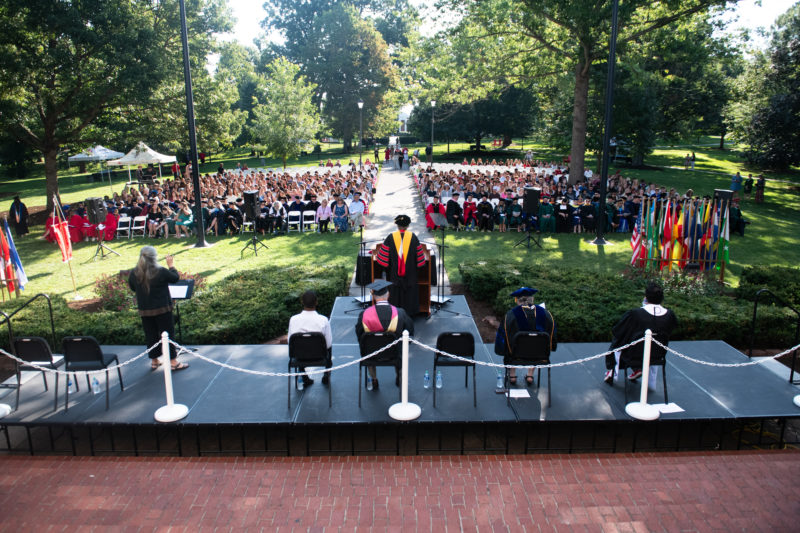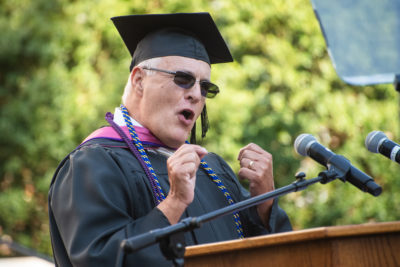
New students at the University of Lynchburg were officially welcomed to campus on Wednesday morning, Aug. 23, during the annual Convocation ceremony, which was held on the Dell in front of Hopwood Hall.
The event celebrated all of Lynchburg’s new students, including the 486 members of the Class of 2027— a number that includes 77 international students. It’s the largest number of international first-year students to matriculate in the University’s history.
The influx also brings Lynchburg’s international, on-campus student total to more than 120 this fall. The new international students include 48 from Nepal, with four more expected in October — the largest demographic to join the Lynchburg community. Overall, 34 countries are represented, including Nigeria, South Korea, the Netherlands, India, Honduras, and others.
There also are 87 new transfer students at Lynchburg this fall.
Following an invocation by Lynchburg’s chaplain, Rev. Nathan Albert, President Dr. Alison Morrison-Shetlar addressed the Class of 2027 and others in attendance. Among other things, she offered advice on how to “open doors and create opportunities for yourself and for others” at Lynchburg.
She urged the students to “Ask questions,” “Think clearly and communicate well,” “Be of high integrity,” “Don’t over-commit,” “Accept responsibility and be accountable for your actions,” “Listen and synthesize,” “Work hard and be prepared,” and “Lead by helping others succeed.”
She concluded, “Now, go out and take full advantage of all of this great University — all of the things we have to offer. Your faculty and staff are here to help you, as are your [Class of] 2027 classmates.
“Those who will graduate in the next three years ahead of you, especially, can be relied on for support and advice. All you have to do is ask.”

Provost and Vice President for Academic Affairs Dr. Allison Jablonski then introduced the keynote speaker, Daniel Murphy, an assistant professor of criminology.
Murphy, who received the 2023 Shirley E. Rosser Award for Excellence in Teaching, encouraged the students to “reach for the stars.” It was a personal message for Murphy, who admits to not doing this years ago, when he first contemplated his own education and career.
“My journey began with the passion of always wanting to be a police officer and helping people in their time of need,” he said in his thick, Boston accent. “The goal of becoming a police officer was the stars I was reaching for.
“However, my parents discouraged me from seeking this career by stating it was just too dangerous.”
Instead of pursuing a law enforcement career, Murphy went to college, where he majored in horticultural studies. He then left college to enlist in the U.S. Army. “I took great pride in serving my country, but something was still missing,” he said. “That unquenchable thirst for wanting more. I needed to strive for those elusive stars.”
Murphy returned to college, majoring in criminal justice this time, and spent 21 years as a police officer specializing in sexual assault investigations. “I felt I had finally latched onto the stars I had so passionately sought,” he said, adding that something was still lacking, though.
“Was there something still missing? I wanted more!”
A teaching assignment in a field training program gave Murphy that “more” he’d been seeking. “This was my first experience with teaching, which in turn inspired me to go to graduate school,” he said. “But was this enough?”
Murphy, who has a master’s degree in justice administration and has been at Lynchburg since 2010, admits he’s still looking for what’s next.
“Just as the sky changes with [the] seasons, so the stars may change in our lives,” he said. “But I encourage you to stretch to reach them, no matter what phase of life you’re in. My desire to reach for the stars has not changed, and I hope yours doesn’t as well.”

